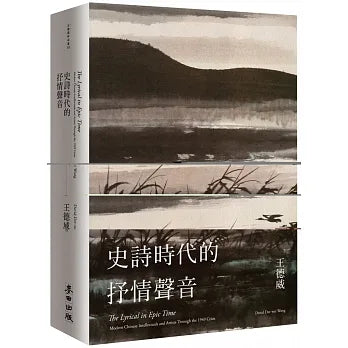沈從文、何其芳、馮至、胡蘭成江文也、林風眠、費穆、梅蘭芳、臺靜農華文世界「中國抒情傳統」的新論述與新演繹
「啟蒙無論如何訴諸理性,需要想像力的創造發明;革命如果沒有撼人心弦的詩情,無以讓千萬人生死相與。」
二十世紀中期中國政局歷經重大動盪鉅變,文學、文化抒情性的張力反而以空前之姿降臨,在在呈現有如史詩般的宏大格局,而處於當的文學與文化人為何選擇以抒情標記他們的心聲?這個時代的抒情話語究竟由何構成?上個世紀抒情的感召與我們的時代有何關聯?
本書探討中國知識分子、文人、藝術家面對民初以來歷史風暴所作的種種選擇,重革命、啟蒙傳統之外,「抒情」成為想像與實踐現代性的可能與不抒情傳統」的脈絡,討論中國與西方抒情論述的洞見及不見,並且探問「抒情批判」對當代中國與華語語系人文研究的關聯意義。
「抒情」,一般看法多以抒情者,小道也。然而,在劇烈變化的時代,文學、文化的抒情張力反而不容小覻。現代世界充滿國族分裂的痛苦、振衰起敝的呼號,大變動仍有人召喚抒情傳統,召喚一種感覺的方法、一種不合時宜的嚮往,反主流而行,更有意義,也更耐人尋味」。
WULOLIFE
《史詩時代的抒情聲音:二十世紀中期的中國知識分子與藝術家》作者: 王德威出版社:麥田
《史詩時代的抒情聲音:二十世紀中期的中國知識分子與藝術家》作者: 王德威出版社:麥田
Sale
Sold out
Regular price
€40,00 EUR
Regular price
Sale price
€40,00 EUR
Unit price
per
Tax included.
Shipping calculated at checkout.
Couldn't load pickup availability
Description
內容簡介
作者介紹
作者簡介
王德威David Der-wei Wang
美國威斯康辛大學麥迪遜校區比較文學博士。大學、美國哥倫比亞系暨比較文學系Edward c. Henderson中國現代寫實小說散論》、《眾聲喧嘩:三○與八○年代的中國小說》、《閱讀當代小說:臺灣.大陸.香港.海外》、《小說中國:晚清到當代的中文小說》、《想像中國的方法:歷史.小說.敘事》、《如何現代,怎樣文學?:十九、二十世紀中文小說新論》、《眾聲喧嘩以後:點評當代中文小說》、《跨世紀風華:當代小說20家》 、《被壓抑的現代性:晚清小說新論》、《現代中國小說十講》、《歷史與怪獸:歷史,暴力,敘事》、《如此繁華:王德威自選集》、《後遺民寫作》、《一九四九:傷痕書寫與國家文學》、《茅盾,老舍,沈從文:寫實主義與現代中國小說》、《抒情傳統與中國現代性:在北大的八堂課》、《寫實主義小說的虛構:茅盾,老舍,沈從文》、《現代抒情傳統四論》、《現當代文學新論:義理‧倫理‧地理》、《華語語系的人文視野:新加坡經驗》、 《華夷風起;華語語系文學三論》、Fictional Realism in Twentieth-century China: Mao Dun, Lao She, Shen Congwen, Fin-de-siecle Splendor: Repressed Modernities of Late Qing Fiction, 1849-1911, The Monster That Is History: History, Violence, and Fictional Writing in Twentieth-century China, The Lyrical in Epic Time: Modern Chinese Intellectuals and Artists Through the 1949 Crisis等。2004年獲選為中央研究院第25屆院士。
相關著作:《小說中國:晚清到當代的中文小說》 《從摩羅到諾貝爾:文學‧經典‧現代意識》《歷史與怪獸──歷史,暴力,敍事(全新增訂版)》 《茅盾,老舍,沈從文:寫實主義與現代中國小說》
譯者簡介
涂航<br data-mce-fragment="1">哈佛大學東亞系博士候選人
余淑慧<br data-mce-fragment="1">國立政治大學
陳婧祾
Middlebury College
宋明煒
Wellesley College
楊小濱<br data-mce-fragment="1">中央研究院
呂淳鈺
William and Mary College
陳思齊<br data-mce-fragment="1">國立臺北大學
蔡建鑫
University of Texas, Austin
王德威David Der-wei Wang
美國威斯康辛大學麥迪遜校區比較文學博士。大學、美國哥倫比亞系暨比較文學系Edward c. Henderson中國現代寫實小說散論》、《眾聲喧嘩:三○與八○年代的中國小說》、《閱讀當代小說:臺灣.大陸.香港.海外》、《小說中國:晚清到當代的中文小說》、《想像中國的方法:歷史.小說.敘事》、《如何現代,怎樣文學?:十九、二十世紀中文小說新論》、《眾聲喧嘩以後:點評當代中文小說》、《跨世紀風華:當代小說20家》 、《被壓抑的現代性:晚清小說新論》、《現代中國小說十講》、《歷史與怪獸:歷史,暴力,敘事》、《如此繁華:王德威自選集》、《後遺民寫作》、《一九四九:傷痕書寫與國家文學》、《茅盾,老舍,沈從文:寫實主義與現代中國小說》、《抒情傳統與中國現代性:在北大的八堂課》、《寫實主義小說的虛構:茅盾,老舍,沈從文》、《現代抒情傳統四論》、《現當代文學新論:義理‧倫理‧地理》、《華語語系的人文視野:新加坡經驗》、 《華夷風起;華語語系文學三論》、Fictional Realism in Twentieth-century China: Mao Dun, Lao She, Shen Congwen, Fin-de-siecle Splendor: Repressed Modernities of Late Qing Fiction, 1849-1911, The Monster That Is History: History, Violence, and Fictional Writing in Twentieth-century China, The Lyrical in Epic Time: Modern Chinese Intellectuals and Artists Through the 1949 Crisis等。2004年獲選為中央研究院第25屆院士。
相關著作:《小說中國:晚清到當代的中文小說》 《從摩羅到諾貝爾:文學‧經典‧現代意識》《歷史與怪獸──歷史,暴力,敍事(全新增訂版)》 《茅盾,老舍,沈從文:寫實主義與現代中國小說》
譯者簡介
涂航<br data-mce-fragment="1">哈佛大學東亞系博士候選人
余淑慧<br data-mce-fragment="1">國立政治大學
陳婧祾
Middlebury College
宋明煒
Wellesley College
楊小濱<br data-mce-fragment="1">中央研究院
呂淳鈺
William and Mary College
陳思齊<br data-mce-fragment="1">國立臺北大學
蔡建鑫
University of Texas, Austin
